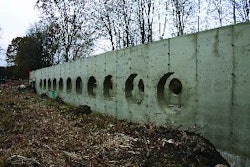
Any contractor, subcontractor, or supplier who provides work, services, material or equipment pursuant to a contract, shall be entitled to a lien for the value of work or services performed, or materials or equipment furnished in accordance with the contract and based upon the contract price, subject to the provisions of sections 9 and 10 of this act. The lien shall attach to the interest of the owner of real property. If a tenant contract for improvement of the real property
On June 18, 2007 -- for the first time in the 13 years since the New Jersey Construction Lien Law was amended -- the Appellate Division has provided analysis of what the statutory term "authorized in writing by the owner" means.
In 1994, New Jersey's Mechanic's Lien Law was repealed and replaced with the Construction Lien Law. Because Construction Lien Claims are statutory in origin, the procedural requirements of the statute are strictly construed by the courts. While the Construction Lien Law clearly states, "[if] a tenant contract for improvement of the real property and the contract for improvement has not been authorized in writing by the owner of a fee simple interest in the improved real property, the lien shall attach only to the leasehold interest of the tenant", the meaning of "authorized in writing" was not been interpreted by the courts until
For a construction lien to attach to the owner's property, the old Mechanic's Lien Law (prior to 1994) provided: When a building is altered or repaired or added to by a tenant or by a person other than the owner of the land which it is erected, only the estate of the tenant or person so altering, repairing or adding to such a building shall be subject to the lien created by this article, unless such alteration, repair or addition is made with written consent of the owner of such land. N.J.S.A. 2A:44-68.
In other words, the standard under the prior statute was that a lien could attach to the fee simple interest of the owner if the owner consented to the work being performed. If the owner had not consented, the lien could only be filed against the leasehold interest of the tenant.
Under the Construction Lien Law, effective in 1994, for a construction lien to attach to the owner's property, the owner's consent is no longer sufficient. Rather, the owner must now give written authorization of the contract for improvement. N.J.S.A. 2A:44A-3. The statute specifically states:
If a tenant contracts for improvement of the real property and the contract for improvement has not been authorized in writing by the owner of a fee simple interest in the improved real property, the lien shall only attach to the leasehold interest of the tenant.
Nowhere in the Construction Lien Law, N.J.S.A. 2A:44A-1 et. seq., is written authorization defined; thus neither guidance nor legal protection is provided to the contractor.
In
Taking a closer look at the facts of the
In 2004, Plaintiff Cherry Hill Self Storage LLC (CHSS) acquired ownership of certain real property in Cherry Hill, New Jersey on which was previously constructed a building containing both a warehouse and a showroom space. At the time of CHSS's acquisition, the building was occupied by Levitz Home Furnishings, Inc. (Levitz) pursuant to a lease Levitz had executed with the previous landowner. When CHSS inherited the lease, it gave notice to Levitz it intended to occupy the warehouse portion of the building for the operation of a self-storage facility. In accordance with the express terms of the lease, Levitz, upon such notice, was required to move the showroom entrance and build out a store-front facade to its space.
Levitz engaged defendant Racanelli Construction Company, Inc. (Racanelli) to perform the work. CHSS was not a party to Levitz's agreement with Racanelli nor did Levitz seek authorization from CHSS to engage Racanelli or approve the contract pursuant to which Racanelli was to perform work. CHSS was not involved in any part of Levitz's construction process, although it did, as an administrative convenience to the township board of adjustments, appear on the same day as Levitz with regard to their respective applications for site plan approval.
After making partial payment(s) to Racanelli, Levitz filed for bankruptcy protection and Racanelli, unable to secure payment from CHSS, filed a lien claim pursuant to the Construction Lien Law, N.J.S.A. 2A:44A-1 to -38. CHSS then instituted the underlying action to discharge the lien pursuant to N.J.S.A. 2A:44A-15, premising its claim for relief on N.J.S.A. 2A:44A-3.
Among other things, CHSS asserted it had not "authorized in writing" the contract by which Racanelli contracted with Levitz for the improvement of the real estate. Racanelli argued the lease provisions requiring Levitz to do the work for which it had contracted, among others, were sufficient to satisfy the authorization requirement of the statute. Specifically, the lease provisions cited by Racanelli required the following:
Levitz perform the specific the work it did; the owner be given notice of the commencement of work on the premises; the tenant cooperate with the owner in obtaining permits and approvals for the construction;
the owner pay $ 150,000.00 toward the work performed; and
the tenant provide the owner with all plans and specifications for the work.
According to Racanelli, the owner went far beyond having knowledge of the work and giving consent by actually appearing before the planning board, presenting its plan for the premises and obtaining zoning approval and site plan approval from the township in order for the construction to take place.
Even with extensive owner involvement and consent to the contract between Levitz and Racanelli, the Appellate Division held no lien could be filed. Its rationale was as follows:
"The plain language of N.J.S.A. 2A:44A-3 requires written authorization of 'the contract for improvement' pursuant to which the work is done; it does not require written authorization for the tenant to undertake the improvement. Said another way, the statutory reference is to the contract pursuant to which the work is performed and not to the work undertaken pursuant to the contract. Because the lease provisions identified by the judge do not even reference a particular contract, they cannot constitute authorization for the execution of a specific contract."
In conducting its analysis, the Appellate Division contrasted the language of N.J.S.A. 2A:44-68 to N.J.S.A. 2A:44A-3 stating, "[Unlike the present statute], N.J.S.A. 2A:44-68 permitted a lien on the fee estate when work was done pursuant to a contract with a tenant if the work 'was performed with the written consent of the owner of such land.'" Conversely, N.J.S.A. 2A:44A-3 specifically requires the landlord's "authorization of a contract." The Appellate Division summed up its opinion by stating:
"[Given] the legislature's evident intent to require a landlord to authorize a particular contract that m[ILLEGIBLE TEXT] result in a lien upon the landlord's property and the undisputed fact that no such authorization was provided here, we conclude the lien was improperly filed."
Based on the
Contractors seeking extra security for work or services rendered on behalf of a tenant should, as a matter of course, be advised to obtain written authorization from the fee owner prior to providing services. By the same token, a landlord client should be advised it can avoid liens being filed against its fee interest by specifically stating in its lease the lease should not be construed as authorizing the contract for improvement pursuant to the Construction Lien Law and that only liens against the leasehold interest will be permitted.

















